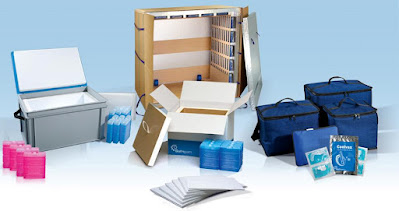Cold chain insulated packaging refers to a
temperature-controlled supply chain system used to transport and store
perishable goods such as food, pharmaceuticals, and medical supplies. The main
goal of cold chain packaging is to maintain the temperature of the perishable
goods within a certain range to prevent spoilage, degradation, or loss of
potency.
The Importance of Cold Chain Packaging
The global food and pharmaceutical industries rely heavily
on cold chain packaging to ensure their products' safety, freshness, and
efficacy. This is especially crucial for perishable goods that are
temperature-sensitive and can spoil or become less effective if not stored or
transported at the right temperature. Cold chain packaging helps to maintain
the quality and integrity of these products and protects consumers from
potential health hazards.
Types of Cold Chain Insulated Packaging
Various types of cold chain insulated
food packaging materials can be used to transport and store perishable
goods. Some of the most common materials include:
Expanded Polystyrene (EPS)
Expanded polystyrene is a lightweight and durable material
that provides excellent insulation properties. EPS containers are widely used
for transporting perishable goods, especially food, as they keep the products
cool for extended periods.
Polyurethane (PU) Foam
Polyurethane foam is a high-performance material that offers
excellent insulation and shock-absorption properties. PU foam containers are
ideal for transporting delicate products such as medical supplies and
equipment.
Vacuum Insulated Panels (VIP)
Vacuum-insulated panels are made of a thin layer of metal
and vacuum-sealed to provide exceptional insulation properties. VIPs are ideal
for cold chain packaging as they can maintain temperature control for longer
periods than other materials.
Vacuum Insulated Container (VIC)
Vacuum-insulated containers are made of stainless steel and
vacuum-sealed to provide exceptional insulation. VICs are ideal for
transporting temperature-sensitive goods, such as pharmaceuticals, as they can
maintain temperature control for extended periods.
Advantages of Cold Chain Insulated Packaging
Maintains Product Freshness and Quality
Cold chain insulated or chilled
packaging helps maintain the temperature of perishable goods, which
helps maintain their freshness, quality, and potency. This is crucial for food
and pharmaceutical products, as even a small deviation from the recommended
temperature can lead to spoilage or loss of potency.
Reduces Food and Drug Waste
By maintaining the temperature of perishable goods, cold
chain insulated packaging helps reduce food and drug waste, a major
environmental and economic issue. This not only helps to conserve resources but
also reduces the cost of waste disposal.
Increases Product Shelf Life
Cold chain packaging helps to extend the shelf life of
perishable goods by maintaining their temperature and preventing spoilage. This
allows products to be transported and stored for longer periods, which is
especially important for products with a short shelf life, such as fresh
produce.
Conclusion
Cold chain insulated packaging is an essential component of
the food and pharmaceutical industries, as it helps to maintain the temperature
and quality of perishable goods. With the increasing demand for fresh and safe
products, the use of cold chain packaging is expected to grow in the coming
years. Choosing the right type of cold chain packaging material is important to
ensure the safety, freshness, and efficacy of perishable goods.

Comments
Post a Comment